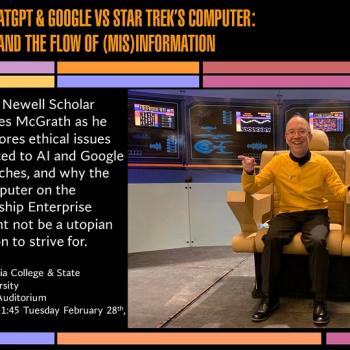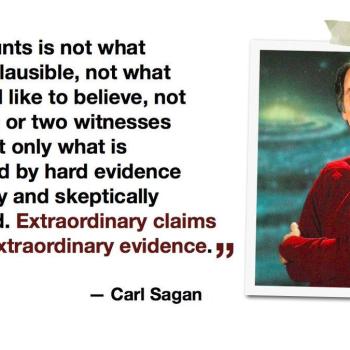I began sharing links to interesting things on other blogs on Facebook and Twitter this morning, and I quickly realized that there were so many that it would soon turn into a torrent! And so here is a round-up of some of the posts that grabbed my interest and seemed worth sharing – with a special treat at the end.
Let’s begin with David Meadows’ “Skept-o-meter,” i.e. a list of things that sets his alarm bells ringing:
- Claim is made by someone who is not a specialist (i.e. with a degree) in the discipline
- Claimant has an “Indiana Jones” type epithet, often self-imposed
- Topic of claim is one of the long-standing mysteries (e.g. Cleopatra’s tomb, Alexander’s tomb, anything related to Atlantis, the Ark of the Covenant, something biblical, etc.)
- Claim is initially made on a press release site and later picked up by mainstream media
- Claim has not appeared in a scholarly journal nor is ‘in press’
- The word “decode” is used at least once in the claim
- The phrase “years of research” figures prominently
- Claimant justifies position with references to the Trojan War or Galileo
- Claimant suggests a “coverup” of some sort by academics
- Claim is made on a significant date (especially if related to early Christianity … Easter and Christmas are the big dates)
- Newspaper report doesn’t actually ask a specialist for a contrary opinion
- Mention of a documentary to come is made in the concluding paragraphs
Of course, many legitimate claims might fall into one or more of the above categories, but it’s the combination of (usually) 3 or so or more which set off the alarm bells.
David wasn’t the only one concerned with nonsensical claims and how to detect them. Michael Heiser has a post on what to do when Christians circulate or promote what he calls “paleobabble” – i.e. nonsense about the ancient world. His list of solutions to the problem that he and David both highlight is too long to repost here, so click through to read it. And see the bottom of this post for a cool picture of a skeptometer shared by Shane Berry together with a list of other similar “effects boxes” one might add to enhance, regulate, and control oneself rather than one’s musical instruments!
Brian Bibb made a very helpful comparison between Biblical literalism and holding on tightly during a roller coaster ride.
Dan McClellan shared a video by Yale University professor Joel Baden, “What Use is the Bible?” Jesus Creed shared two videos by Francis Collins.
The Deeps of Time responded to Jerry Coyne on the historic relationship between Christianity and science. See also the article in Forbes on the same subject.
Danut Manastireanu highlights the misguided approach of Paige Patterson of the Southern Baptist Convention.
Eye on the ICR looked into claims about dinosaurs on Noah’s ark.
Steve Newton blogged about creationism and the Grand Canyon.
Larry Hurtado pointed out how long ago certain ideas about Paul the apostle and the mystery religions were debunked.
Jeri Massi and Jeremy Myers blogged about Jesus and the social gospel.
Paul Regnier drew attention to a free ebook about religion and science by Mel Thompson.
Richard Carrier blogged about the closing down of the Facebook account of Acharya S.
Marcus Borg discussed whether Christianity has a future.
John Shore explained why the Bible’s laws about homosexuality are “unbiblical”:
So there is Jesus directing us to understand that if breaking a Biblical “law” does not violate the Great Commandment, then that law should no longer be considered a moral law. And that is, in fact, the standard which Christians have always used to evaluate Biblical laws. No one wants to be kept quiet in church. No one wants to be told what they can and can’t do on a Sunday. No one wants to be unable to leave an abusive marriage. No one wants to be a slave. So as they were found to be out of accord with the Great Commandment, the Christian understanding of the “laws” pertaining to those Biblical injunctions evolved and finally changed.
You know what other Biblical “law” is out of accord with the Great Commandment? The one which holds that people who are born gay have but two choices: to spend their lives celibate and unpartnered, or to deserve being shunned and denigrated because their very existence is a moral offense to God.
In the manner of other such “laws,” it is time for the unjust Christian “laws” against homosexuality to change. It is time for the condemnation of gay people to be understood by all Christians as an egregious moral affront to God, since it is in such clear violation of what Jesus Christ himself called the most important law of all.
J. K. Gayle traced the history of a frozen phrase in Greek, including in the Bible.
Jeff Dunn discussed his own trouble with Scripture, and a problematic approach to it in Evangelicalism. Here is a sample:
Evangelicalism does not invite questions, especially when it comes to the Bible. There is no mystery. There are only answers. We have the telescope to blame. The telescope allowed us to explore the galaxies and explain what once had been inexplicable. The mystery of the universe was replaced with charts and diagrams and explanations. We have done the same with God and the Bible. We are not allowed to say, “That doesn’t make sense to me” and leave it at that. We must press forth to come up with an answer. Or, rather, we must accept the answer that is spoonfed to us each Sunday morning from preachers who insist that we have to understand the Bible rather than just believe.
Finally, here’s the skeptometer, as promised (be sure to look closely at the details):
















